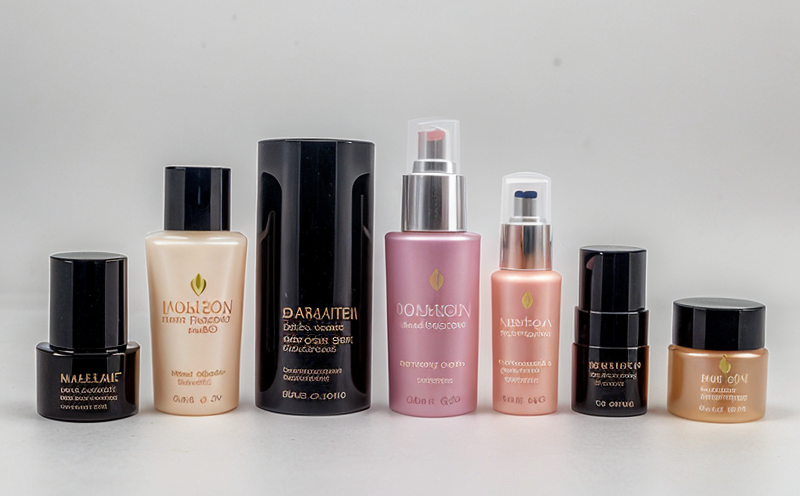Phthalate Migration Testing from Cosmetic Packaging
The safety of cosmetic products is a paramount concern in the beauty and personal care industry. Regulatory bodies around the world have set strict guidelines to ensure that consumers are protected against any potential health risks associated with ingredients used in these products. One such critical aspect is phthalate migration testing, which focuses on ensuring that certain chemicals do not migrate from the packaging into the cosmetic product itself. This service addresses a specific concern within this broader scope: the migration of phthalates from plastic packaging materials commonly found in cosmetics.
Phthalates are widely used in various plastics due to their flexibility and durability properties, but they can also pose health risks if they leach into products like shampoos, lotions, or makeup. Regulatory standards such as the European Union’s Restriction of Hazardous Substances (RoHS) Directive and the U.S. Consumer Product Safety Improvement Act (CPSIA) require manufacturers to demonstrate that phthalates do not migrate from packaging materials into the product beyond safe levels.
In this service, we employ advanced analytical techniques to determine whether phthalate migration has occurred in cosmetic products due to interaction with their packaging. Our testing methods are meticulously aligned with international standards like ISO 13965:2007 and ASTM F2338-14, ensuring accuracy and reliability.
Our process involves careful preparation of the samples by simulating real-world conditions under which products might come into contact with their packaging. This includes testing at various temperatures and durations to mimic storage and handling scenarios. Once prepared, we conduct extraction tests using solvents appropriate for each type of plastic used in the packaging. After extraction, the phthalates present are quantified through chromatographic analysis.
The results provide detailed information on the extent of migration, helping clients ensure compliance with relevant regulations while also enhancing consumer confidence. By offering this service, we contribute to maintaining high standards of safety and quality assurance throughout the supply chain.
Understanding the importance of phthalate-free products extends beyond just regulatory requirements; it reflects a broader commitment to environmental sustainability. Phthalates are known endocrine disruptors that can affect reproductive health when present in significant quantities. Ensuring no migration occurs not only protects consumers but also aligns with global efforts towards reducing harmful chemical usage.
Our expertise lies not only in executing these tests accurately but also in providing insights based on our findings, helping clients make informed decisions regarding their packaging choices and product formulations. This proactive approach ensures continuous improvement and adaptation to evolving standards within the industry.
Why It Matters
The migration of phthalates from cosmetic packaging into the products themselves is a critical issue that impacts both consumer safety and brand reputation. Here’s why this testing matters:
Health Risks: Phthalates are classified as endocrine disruptors, which means they interfere with hormone systems in humans and wildlife.
Regulatory Compliance: Non-compliance can lead to fines, product recalls, and damage to brand image.
Consumer Trust: Demonstrating adherence to stringent safety standards builds trust among consumers who are increasingly concerned about the ingredients they use daily.
By implementing rigorous testing protocols, manufacturers can ensure that their products meet or exceed regulatory thresholds for phthalate content in contact materials. This proactive measure helps protect both end-users and the environment from potential health hazards associated with harmful chemical exposure.
In addition to safeguarding public health, thorough testing also supports sustainable practices by promoting the use of safer alternative packaging solutions when necessary. It encourages innovation within the industry towards more eco-friendly options without compromising product integrity or functionality.
Applied Standards
| Standard | Description |
|---|---|
| ISO 13965:2007 | American Society for Testing and Materials (ASTM) F2338-14 |
| These standards provide guidelines on how to conduct phthalate migration tests using appropriate extraction solvents, incubation periods, and analytical techniques. They ensure that all testing methods used are consistent across different laboratories. | |
Our laboratory adheres strictly to these international standards when performing our tests. This consistency ensures accurate results and reliable data, which is crucial for meeting regulatory requirements and maintaining product safety.
The choice of extraction solvent plays a vital role in this process as it directly affects the amount and type of phthalates extracted from the packaging material into the cosmetic product. We select solvents based on their compatibility with different types of plastics used in packaging, ensuring that all relevant compounds are captured accurately during the testing procedure.
Incubation period refers to the time allowed for the interaction between the cosmetic product and its packaging under controlled conditions before extraction takes place. This duration varies depending on factors such as temperature and humidity levels within typical storage environments. By following prescribed incubation times, we ensure that our test results reflect real-world scenarios accurately.
Competitive Advantage and Market Impact
Ethical Leadership: By leading the way in phthalate migration testing for cosmetic packaging, our clients gain a competitive edge over competitors who may still be lagging behind regulatory requirements.
Enhanced Brand Image: Demonstrating commitment to product safety through rigorous testing enhances brand reputation and builds consumer trust.
Our service has significant implications for the market, particularly in sectors where transparency regarding ingredient sourcing and manufacturing processes is essential. Companies that invest in this form of quality assurance are better positioned to meet growing demand from health-conscious consumers who prioritize safety above all else.
In addition to enhancing brand reputation, our testing services also contribute positively to regulatory compliance efforts worldwide. As regulations evolve, it becomes increasingly important for manufacturers to stay ahead of changes by implementing robust testing programs like ours early on. This proactive approach ensures that they remain compliant even as new rules come into effect.





